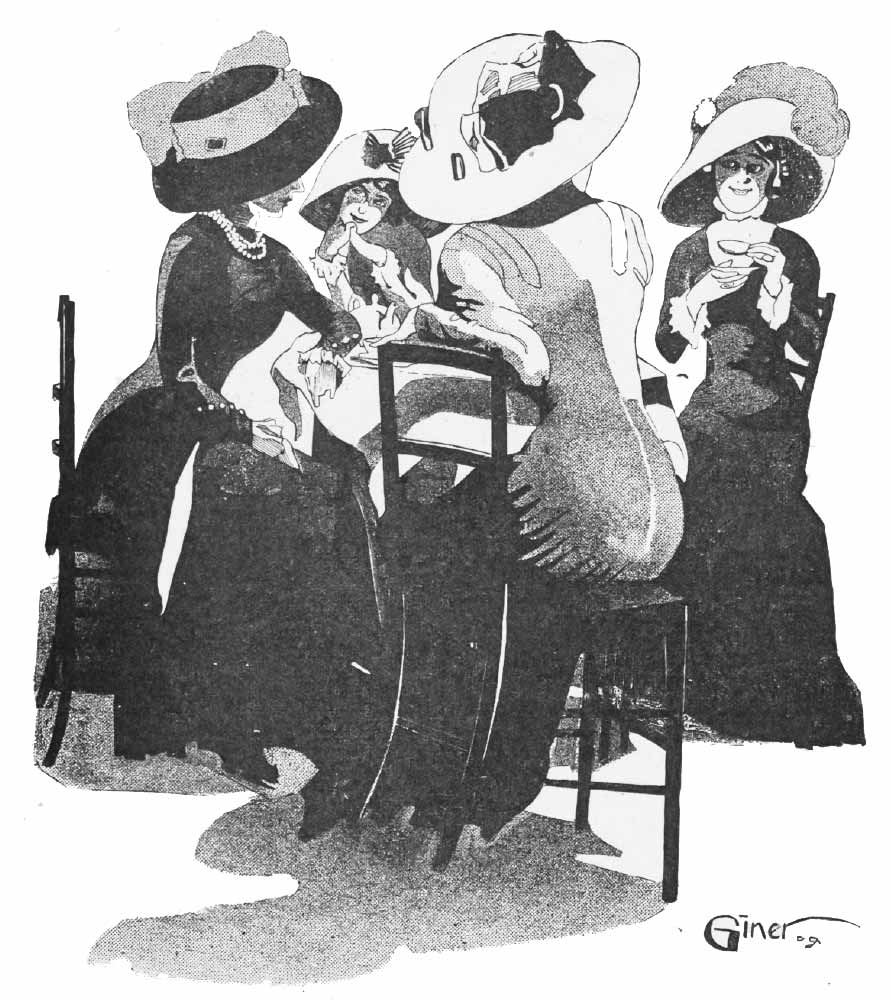Crystal gazin
Tea cup readers
The police campaign against Melbourne tea room tea cup readers seems to have ended that curious revival of "scrying" which was one of the fruits of the depression.
"Scrying" is an old fashioned word which no longer has a place in our every day vocabulary, although the art it represents is likely to be with us as long as the world lasts. Perhaps a modern equivalent would be "seeing things." The seeresses of the tea rooms usually "see things" in the bottom of cups; their more secret and obscure sisters, the wise women of the suburbs, seek enlightenment In the crystal ball.

Ancient Art
Of the two cults, crystal gazing makes the strongest appeal to imagination, and not only, I think, because a crystal ball is in itself a thing of considerable charm.
The art of scrying, we feel instinctively is older than tea, and there is something at once more venerable and more convincing about a device which was known to secret Egypt.
It is almost disappointing to our sense of romance to realize that the crystal ball, too, has its ancient rivals. In India, equally satisfactory results were achieved by gazing into a blot of ink; the Maoris used a drop of blood, and the simple Roman preferred a pond. To this day the Fez tradition a that the future may be discerned by gazing steadfastly into a glass bowl, and the American Indian, if he has any sense at all of his romantic past, fills a vessel with water and looks upon it until signs and portents appear.
What Is It?
Few investigators have denied that some people really do dream dreams and see visions when they look long on still water or clear glass. The rationalist's explanation is that prolonged gazing at a polished surface induces, in abnormally nervous or hysterical subjects, a state of mild hypnotism, and that the things they "see" are called up from the inner consciousness. It seems very probable; but what things exist in that consciousness, and why ? When the depths of all seas shall be sounded, there may still remains few mysteries in that most obscure region, of our being, however neatly named and classified by the psychologists.
Strange Surprises
The confirmed tea cup and crystal gazer's patron cares nothing for these dusty problems, but lives in a world of sudden journeys, unexpected legacies and triumphs always round the corner. In extreme cases, she is capable of selling her possessions or poisoning her friendships with suspicion at the mere warning of the tea leaves.
It is this element in fortune telling which, has always aroused the hostility of serious people, even from the most superstitious times. In his "Tryall of a Man's Owne Selfe," Newton, writing in the beginning of the eighteenth century, inquired "whether the Governors of the Commonwealth have suffered Palmestres, fortune tellers, stage-players, sawce-boxes, enterluders, puppit-players, loyterers, vagabonds, land leapers, and such like cozening make-shifts, to practice their cogging tricks and rogish trades within the circuite of his authorise and deceive the simple people with their vile forgerie and palterie."
Dr. Ferrand, the author of "Love's Melancholy," published thirty years later, seems rather surprised that "this act of Chiromancy have been so strangely infected with, superstition, deceit, cheating and (If durst say so) with magic also," but he notes "that now no man professed publicly this cheating art but thieves. rogues, and beggarly rascals."
Milder Aspects
This is a picture which has little likeness to the tearoom fortune-telling known in our own day, in which the chief practitioners were women who dealt much in promises of employment, legacies and lucky stars. Many of them bore themselves the mark of anxiety, as if all their peering into the future showed them no more than an uncertain and harassed existence. They were strange comforters to worried housekeepers, worn out with the effort of making ends meet, which daily strained further apart. "Your husband is worried about his employment," might be said quite safely to nine out of ten careworn patrons, who carried in their eyes signs that were clearer than anything seen in the tea leaves. As confidently might the seeress add that better times were coming, and so on assured, at least, of being believed by hearts credulous of coming happiness.
The Surprised Prophetess
I once saw a curious transformation in one of these twentieth century scryers. She was a tired looking little woman, whose gorgeous gypsy draperies emphasised something very homely and un-prophet-like in her face. Called away from the tea room for five minutes, she returned in that mood of incredulous joy which must spill itself over in confidences to a stranger. It was a plain enough little chronicle for the spiritual descendant of Egypt's seers—nothing but the story of twenty years of widowhood and breadwinning, with spirited efforts at dressmaking, hopeful attempts at keeping boarders, charwoman days, and intervals of unemployment. The good news she had just received was that she had won a £10 prize in a competition, and for nothing more exotic and romantic than a home-made cotton frock.
There are people who speak loftily of money and its sordid uses, but if ever I saw magic in operation it was the transformation wrought by that unexpected cheque. Ever since, I have thought that the tea cup readers are not all charlatans, only romantics with a livelier sense of that sublime faith which sustains those who live on the edge of a penny, a belief, unconquerable and undying, in something better round the corner.
Elizabeth George
The Advertiser (Adelaide) 14 January. 1933